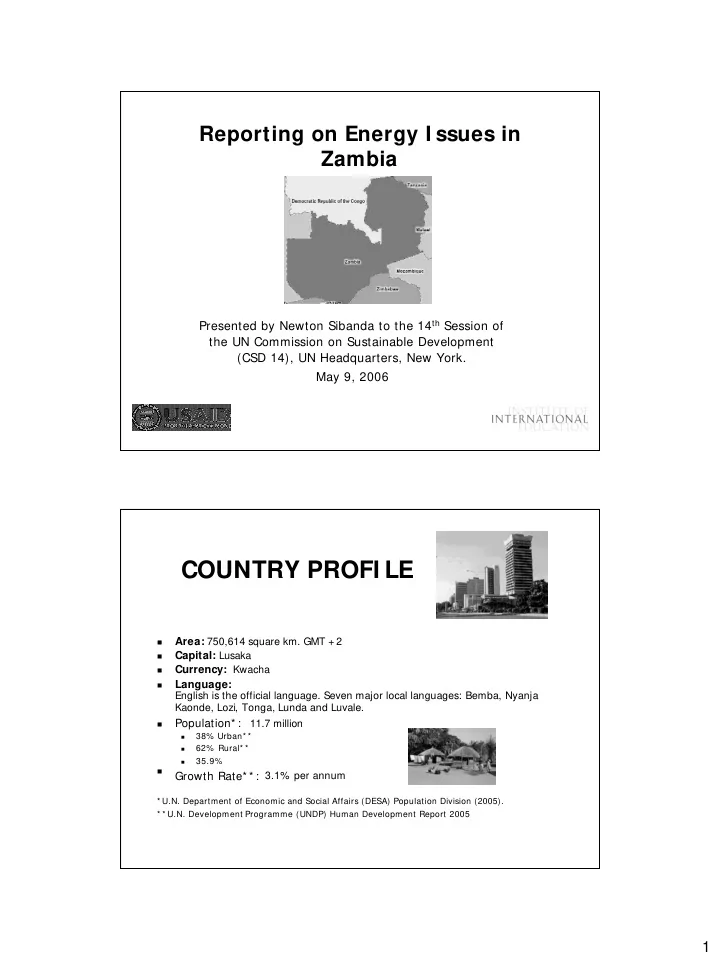

Reporting on Energy I ssues in Zambia Presented by Newton Sibanda to the 14 th Session of the UN Commission on Sustainable Development (CSD 14), UN Headquarters, New York. May 9, 2006 COUNTRY PROFI LE Area: 750,614 square km. GMT + 2 � Capital: Lusaka � Currency: Kwacha � Language: � English is the official language. Seven major local languages: Bemba, Nyanja Kaonde, Lozi, Tonga, Lunda and Luvale. Population* : 11.7 million � 38% Urban* * � 62% Rural* * � 35.9% � � Growth Rate* * : 3.1% per annum * U.N. Department of Economic and Social Affairs (DESA) Population Division (2005). * * U.N. Development Programme (UNDP) Human Development Report 2005 1
Population Statistics: � Average life expectancy: 37.4 years � Human development index (HDI rank): 166 � Literacy � 2003: 67.9 percent average � Male, 2003: 76.1 percent � Female, 2003: 59.7 percent Source: UNDP - Human Development Report 2005 ECONOMY: Population living on less than US$1 a day: 63.7% (2002) � One of world’s poorest and most debt -ridden countries. � Traditionally dependent on mining of copper, cobalt, zinc and lead, � accounting for 53% of national budget. Percentage HI V+ (adults aged 15-49): 16.5% (End 2003) � HIV/AIDS currently Zambia’s development and humanitarian crisis. � Identified central theme for poverty reduction strategies. � Featuring as a cross-cutting theme in UN Development Program � Assistance Framework (UNDPAF) document. Sources: Sources: UNDP Human Development Report,2005 � � UN Programme on HIV and AIDs (UNAIDS) 2004 2
Access to Energy: � 20 percent of population have access to electricity. � In rural areas, only 2 percent have access to electricity. � The majority of population in rural and peri-urban areas are dependent on charcoal for energy. Sources of Energy Wood fuel : 80% � Electricity : 9% � Petroleum :10% � Others : 1% � Energy Sector Goals: � Rural electrification – increase from 2% to 15% in 10 years � Urban electrification – increase from 45% to 78% in 10 years � Charcoal consumption - reduce by 400,000 tonnes in 10 years � Re-introduce LPG in households � Increase generation capacity � Increase power export � Increase regional connectivity 3
Barriers to Rural Electrification: � Low density demand. � High cost of transmission and distribution systems. � Consumer acceptance. � Low levels of cost recovery. � Lack of finance. � Frail institutional infrastructure in most rural communities. I mplications for the Media: � Profile places premium on Media to do something. � Important role for the Media in sensitisation, public awareness and prompting action to address energy problems. � “Whistle-blower” role for Media. 4
Energy Reporting Status: Still on the fringes of mainstream media � Occasional reportage of energy issues: fuel crisis, scandal � etc. Evolution of reporting on energy issues in Zambia: � Status quo � I ssues � The importance of quality reporting as a way of contributing � to energy development as well as responding to socioeconomic, climate and environmental concerns. Energy Sector � Working on expansion plans for energy pilot projects. Installation of solar home systems: Nyimba 100, Lundazi 150 and Chipata 150 � International response to articles: attracting interest from development organisations such as GTZ InWent, a German Capacity building programme, who sent personnel from projects similar to the one in Nyimba for training in Germany and within the region. � Reporting on the rural electrification efforts in the Mkushi farming block and its boosting of agricultural productivity awakened other communities to the need for rural electrification as a necessity for development and improved agricultural production. 5
Examples of Energy Reporting Making a Change: Reporting on a solar power success story in � Nyimba, an area that was off-grid, contributed to expanding the reach of solar power to other villages. Reporting on the elements of success, the best � practices that came out of the project and the success in Nyimba, inspired replication of solar projects in other towns of Zambia’s Eastern Province: Chipata, the capital, and Lundazi, another remote district in the same province. Reporting Challenges: � There are many obstacles in getting to the nitty-gritty of reporting on energy issues, e.g, difficulties in accessing information, statistics on energy issues, and internet facilities are a major detriment to reporting. � Journalists respond to those challenges by networking and sharing experiences, but this effort needs to be improved and supported. 6
Energy as News Agenda- The I ssues Energy – Poverty Nexus: Energy poverty is still reigning � supreme. Editors in Zambia: Their response to news on energy � Do editors and reporters have a phobia for the science surrounding � energy issues? The need to engage editors to make them appreciate energy � issues and make them part of the news agenda. The audience: Their views on energy news � High value for boredom? � Ingredients of drama, personality and conflict are important in � news stories The reporters: Writing energy stories in the context of people not � just statistics, etc. How to inspire more journalists to see this relationship and want to � write on energy? Way Forward: � Making energy issues part of mainstream Media news agenda; “Humanising" energy stories. How to encourage more reporters to write on energy (workshops, training for editors, competitions and awards, etc). � Writing energy stories in compelling ways. � Energy issues slowly making it into the news agenda. � Innovation by journalists with a keen interest in environmental issues is helping to slowly make more space available for energy stories in newspapers and electronic Media. � Donors like the UN or bilateral agencies can help to strengthen the role of journalists in energy development. 7
HOW DONORS CAN HELP � Support training for journalists � Support and host networks of energy journalists e.g World Bank on water Media. � Provide reliable research and information links for energy journalists. THANK YOU! 8
Recommend
More recommend